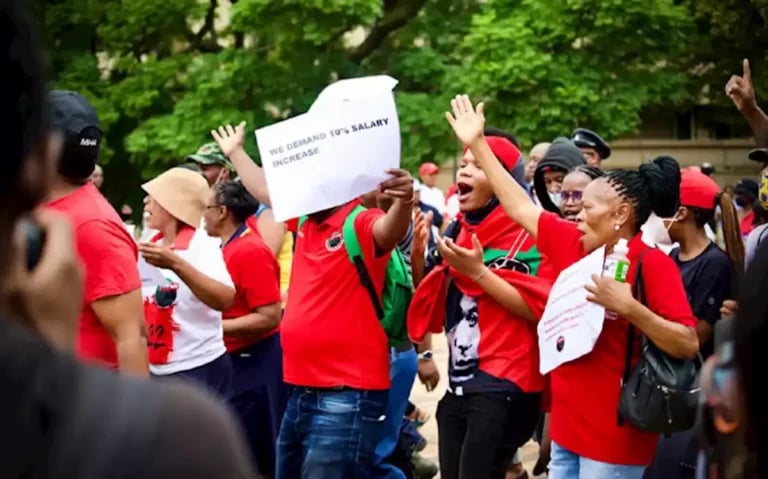
PHOTO: SABC News
“We believe this judgement will bring some form of stability in health facilities across the country. This is a victory for the innocent, vulnerable and un-unionised patients who have suffered the consequences of the disruptive and violent strike action,” health department spokesperson, Foster Mohale said, adding that the department believes that Nehawu will implement the judgment and inform its members to return to work as soon as possible.
Earlier this morning, Health Minister Joe Phaahla indicated that more deaths could be linked to the countrywide strike. He visited the Thelle Mogoerane Regional Hospital in Vosloorus, one of the public facilities hardest hit by the strike, where members of the South African Defence Force and police were stationed at all the entrances to ensure the safety of patients and non-striking workers.
Today’s court ruling followed hours after Nehawu vowed to intensify the strike, and the Health and Allied Workers Indaba Trade Union (Haitu) which represents around 20 000 health workers announced that it was joining the industrial action.
Earlier today, the President of the Critical Care Society of South Africa, Prof Fathima Paruk told AxessHealth that the strike has severely disrupted the provision of care to critically ill patients at several hospitals and that the implications could be catastrophic for these patients.
“Under normal circumstances, critical care is under pressure due to the shortage of skilled health workers like nurses, intensivists, allied health professionals and others who comprise the ICU team. It is a constant challenge to juggle the demand and supply of ICU beds. The current disruption exacerbates these challenges significantly because there are even fewer available healthcare resources and increased demand for ICU beds. The delay in access to healthcare caused by the strike means an increased demand for ICU beds in a system where there are no reserves,” Prof Paruk said.
However, she refrained from giving more details on the real impact of the protest action, referring AxessHealth to the Health Department and the CEOs of the relevant facilities.
Today’s judgment will remain in place until a ruling is made on Nehawu’s appeal against an initial order by the same court on 4 March that interdicted the strike.
In its ruling today, the Labour Appeal Court said there could be no doubt that the strike notice given by Nehawu was “intentionally broad and reckless”.
“It gave notice of the strike ‘across all departments and provinces (including Sassa, SIU and SANBI)’ and in all workplaces in the public service’,” the appeal court states.
“Nehawu issued this notice with the knowledge that hundreds of thousands of its members were employed in essential services and that it was impermissible in terms of Section 65(1(d)(i) for them to strike, as it was for the union’s members at Sassa, SIU and SANBI since these entities did not fall within the public service as defined.
“When called upon in February to confirm that it ‘will actively ensure that members rendering essential services will not participate in the strike’, no response was received from Nehawu, the court added.
In a statement yesterday NEHAWU said it wants “to demonstrate to government the seriousness with which the union takes the concerted effort to underplay the role and significance of public servants who are at the coalface of service delivery.”
The union wants a 10% salary increase while government has offered 4.7%.